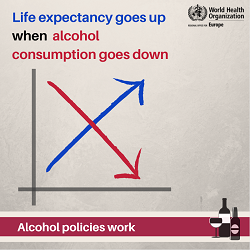Alcohol-related deaths drop in Russian Federation due to strict alcohol control measures, new report says

A plunge in alcohol consumption has been linked to a dramatic rise in life expectancy in the Russian Federation, a new WHO report reveals. This follows a set of comprehensive alcohol control measures put in place by the state since 2003.
The report, “Alcohol policy impact case study: the effects of alcohol control measures on mortality and life expectancy in the Russian Federation”, shows that total per capita consumption has been declining since 2003 and dropped by 43% until 2016 – with a 40% decline in recorded consumption and a 48% decline in unrecorded consumption, referring to alcohol produced and sold outside governmental control.
This trend mirrored a drop in all-cause mortality by 39% in men and 36% in women between 2003 and 2018, with the sharpest decline in causes of death linked to alcohol consumption. This helped average life expectancy in the Russian Federation reach a historic high in 2018, at almost 68 years for men and 78 years for women.
“The dramatic decline in consumption of homemade, smuggled or illegally produced alcohol in the Russian Federation is attributable to the government’s adoption of evidence-based alcohol control policies. These results show that measures such as the introduction of monitoring systems, price increases and limited alcohol availability work to save lives and health system costs. I trust that other countries in Europe will adopt similar policies to protect people’s health,” said Carina Ferreira-Borges, Programme Manager, Alcohol and Illicit Drugs, WHO/Europe.
In 2011, the Russian Federation supported the adoption of WHO’s European Action Plan to Reduce the Harmful Use of Alcohol 2012–2020, and has been implementing many of its recommendations since. A series of policy interventions, recommended as effective or cost-effective by WHO, were adopted and enforced over the last years. For instance, the government:
- gradually raised excise taxes on alcohol;
- introduced a minimum unit price policy on vodka as far back as 2003, then increased the minimum unit price over the years, before expanding this policy to other alcoholic beverages;
- introduced a real-time tracking system on the production and sale of alcohol;
- began a comprehensive night ban on off-premises sales of alcohol nationally, with even stricter restrictions on alcohol availability in some regions, as well as strict policies on alcohol-free public space and alcohol marketing.
“Evidence-based policy interventions, such as those put in place in the Russian Federation, also work to reduce the burden of illness and death from noncommunicable diseases, which can be a game-changer in achieving Sustainable Development Goal 3.4 to reduce premature deaths from noncommunicable diseases by 33% by 2030,” said Dr Bente Mikkelsen, Director of the Division of Noncommunicable Diseases and Promoting Health through the Life-course.



